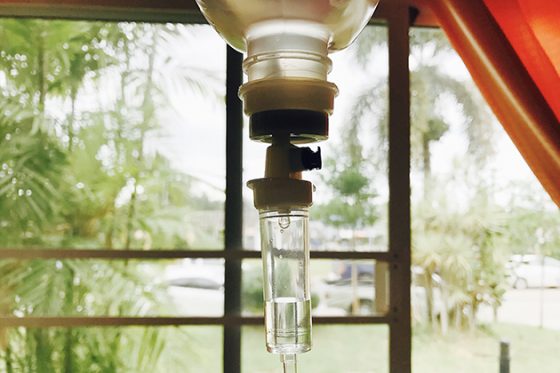 The destruction caused by Hurricane Maria in Puerto Rico last month has created major disruptions for the island’s pharmaceutical product and medical device manufacturing facilities. Days of interruption and damage to manufacturing plants are affecting international supply chains for products such as cancer and HIV treatments, immunosuppressants for patients with organ transplants, and small-volume bags of saline, which are necessary for patients who need intravenous solutions.
The destruction caused by Hurricane Maria in Puerto Rico last month has created major disruptions for the island’s pharmaceutical product and medical device manufacturing facilities. Days of interruption and damage to manufacturing plants are affecting international supply chains for products such as cancer and HIV treatments, immunosuppressants for patients with organ transplants, and small-volume bags of saline, which are necessary for patients who need intravenous solutions.
Puerto Rico is the fifth-largest territory in the world for pharma manufacturing and produces about half of the world’s top-selling patented drugs, according to a 2016 report from Pharma Boardroom. Short-term economic losses are being estimated, while concerns persist about the storm’s long-term effect on employees’ abilities to travel to work, the safety and efficiency of the machinery used and the ability to keep the facilities running on generators. In a statement issued by the Food and Drug Administration (FDA) on Oct. 6, Commissioner Scott Gottlieb detailed plans to help Puerto Rico recover its medical product and manufacturing base, which he said “are a key component of the island’s economic vigor.”
“[..]even the facilities that sustained relatively minor damage are running on generator power. They could be without commercial power for months…Moreover, most of the facilities that we know of, that have resumed production, maintain only partial operations. New shortages could result from these disruptions and shortages that existed before the storms could potentially be extended.”
Citing data from the Bureau of Economic Analysis, Gottlieb said that pharmaceutical products manufactured in Puerto Rico “make up nearly 10% of all drugs consumed by Americans. And that doesn’t even account for medical devices.” He noted that the FDA is keeping a close watch on about 40 critical pharmaceutical and biological drug products which, in the event of a shortage, “could have substantial impact on the public health.”
He added, “In urgent cases, when critical products are at issue, we’ve intervened over the last two weeks to help firms secure fuel to maintain production lines, get clearance to move logistical support into the island or finished goods to their recipients.”
The Washington Post reported that more than four dozen FDA-approved drugmaking facilities are in Puerto Rico, including ones owned by Pfizer Inc., Merck, Eli Lilly, Johnson & Johnson, Bristol-Myers Squibb and Amgen. Baxter International Inc., which the Post cited as being the “dominant player” in the IV market, issued a statement acknowledging the impact of the storm on its operations:
Our sites sustained minimal damage, and we’ve initiated limited production activities in all of our facilities. In addition, we are examining all opportunities to leverage Baxter’s global manufacturing network as we continue efforts to restore operations in Puerto Rico.
As it relates to product supply, in advance of the hurricanes, we implemented our hurricane preparedness plan to help mitigate potential impact. We have also been delivering products to customers in Puerto Rico to help address patient need on the island. And we are continuing to proactively communicate with our customers the actions we are taking to minimize potential disruptions, including closely managing product inventory.
Not all facilities have suffered damage, however. Amgen announced on its site that back-up generators are powering its Puerto Rican site and that, “No product nor in-process inventory has been lost, and … the inventory maintained by the Company and its global distribution network is sufficient to meet patient demand.”

 Maria wiped out power on the island and destroyed infrastructure and cell towers, leading to massive shortages. Even though a waiver had been granted to Texas and Florida after Hurricanes Harvey and Irma, the Department of Homeland Security initially said there was no need to waive the restriction for Puerto Rico, as it would not address the issue of the island’s damaged ports.
Maria wiped out power on the island and destroyed infrastructure and cell towers, leading to massive shortages. Even though a waiver had been granted to Texas and Florida after Hurricanes Harvey and Irma, the Department of Homeland Security initially said there was no need to waive the restriction for Puerto Rico, as it would not address the issue of the island’s damaged ports.